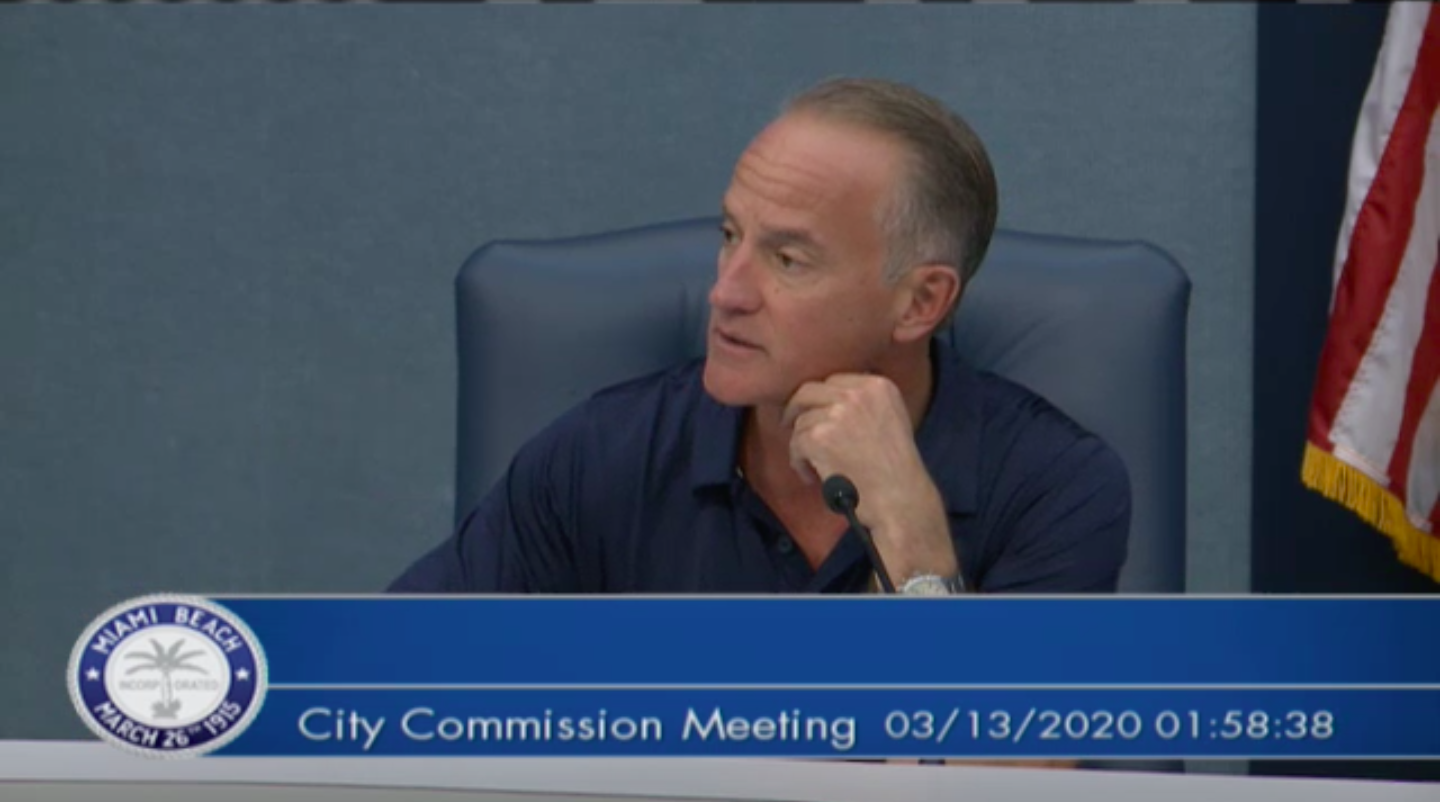
Screenshot via City of Miami Beach

Audio By Carbonatix
One of the scariest aspects of the spread of the novel coronavirus is that even the world’s preeminent epidemiologists lack consensus about the pandemic’s trajectory. As cases mount across Florida, the United States, and around the globe, a lot we don’t know about the virus remains.
One major question mark: If you contract COVID-19 and recover, are you immune for life?
The scientific community doesn’t have a clear answer. Nevertheless, Miami Beach Commissioner Ricky Arriola at an emergency meeting yesterday made a self-described bold proposal: that the city consider the notion of infecting its first responders so they could develop antibodies.
“Might we start thinking about — it’s dangerous but bold… our first responders voluntarily taking one for the team, going through the two weeks — guys, we’ve got to be serious about this — and then developing the immunity?” the commissioner suggested.
Miami Herald reporter Martin Vassolo was the first to point out Arriola’s comments on Twitter. Other reporters, including the Herald‘s Julie K. Brown and the Los Angeles Times’ Matt Pearce, also circulated the remarks.
Because Florida. We always lead the nation with “bold” ideas! https://t.co/vta6RG2Jwr
— julie k. brown (@jkbjournalist) March 14, 2020
when you volunteer for the rona pic.twitter.com/54Cfe4BITu
— Matt Pearce ???? (@mattdpearce) March 14, 2020
Here’s the full transcript of Arriola’s monologue from yesterday’s meeting:
Are there any doctors in the audience? [silence] I don’t know, ’cause I’ve reached out to a couple of doctor friends to confirm. I don’t know yet, but I’ve been trying to research and no one’s answered the question: Do you develop — once you have the coronavirus, assuming you make it through — do you have immunity? Some doctors have told me yes.
To the extent that that is true, might we start thinking about — it’s dangerous but bold — it’s like a chickenpox, thank you, with our first responders voluntarily taking one for the team, going through the two weeks — guys, we’ve got to be serious about this — and then developing the immunity? … It is our job to think boldly, and we’ve got to start thinking about this.
Arriola’s comments came after Miami Beach Mayor Dan Gelber expressed concern that the city’s first responders might unknowingly spread the virus to residents and one another.
“Frankly, if I had one message to send out to other people right now in government, at other levels of government, I’d say we desperately need to be able to test as much as we want to test and as often as we can test,” Gelber said. “We are this close to losing a lot of our first responders, and I don’t want to sound like the sky is falling, but that is something that could happen at any moment, and if it does, I think we’d be in a terrible place.”
Speaking by phone with New Times, Arriola defends his idea. He emphasizes it was simply a suggestion and said he wouldn’t want to move forward without the blessing of the scientific and medical communities.
“It was a question — let’s put it that way,” Arriola says. “I’m trying to be forward-looking and ask tough questions because if you don’t and this thing catches you by surprise, society could shut down.”
In terms of city operations, Arriola says he worries about what would happen if Miami Beach’s first responders were hit with the virus all at once.
“What are we gonna do in the event that our first responders start getting either exposure to the virus or catch the virus and we lose 25 percent, 50 percent of our first responders?” he posits. “If we’re in a state of curfew or martial law and we have 50 percent of our first responders, what do we do?”
That’s why, according to the commissioner, it might make sense to expose willing first responders to the virus in a controlled setting with medical supervision.
Arriola says he, too, would volunteer to contract coronavirus in that scenario.
“It’s a matter of do you want to just randomly get it, or do you want to control when you get it?” the commissioner tells New Times. “Does it make sense to do this in a controlled, safe environment so they have immunity?”
To date, the scientific community has no decisive answer as to whether those exposed to COVID-19 develop immunity. So far, a small number of infected people — including some in China — have tested positive for coronavirus twice. Scientists say it’s unlikely but possible for people to become infected by the virus multiple times, although patients infected with similar viruses in the past have developed antibodies. But at this time, there isn’t enough data on the current strain of coronavirus to say with certainty that COVID-19 survivors become immune.
Arriola’s “bold” proposal echoes a policy being pushed in the United Kingdom, whose chief scientific adviser, Sir Patrick Vallance, has suggested a virus-management policy based on herd immunity. Vallance proposes allowing 60 percent of the population — ideally, its healthiest citizens — to contract coronavirus, which, theoretically, could prevent the remaining 40 percent from falling ill. Bold indeed.